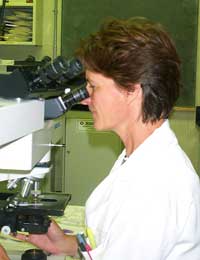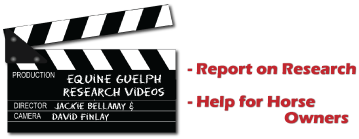Researcher Profiles
Dr. Dorothee Bienzle
| View Dr. Bienzle |
 |
"Recurrent airway obstruction (heaves) is a big disease wherever horses are stabled. A horse with heaves may be unable to perform as an athlete. The condition is treatable in many respects but not entirely reversible." |
"Recurrent airway obstruction is a big disease wherever horses are stabled. With our cold climate horses are stabled much of the year and are therefore exposed to dust mites, bacteria and mould to which they become sensitive, leading to the development of recurrent lung inflammation. In horses, for reasons we don’t quite understand, this can become a vicious cycle that perpetuates itself leading to the condition commonly known as heaves." Dr. Bienzle adds, "A horse with heaves may be unable to perform as an athlete. The condition is treatable in many respects but not entirely reversible."
| Dr. Bienzle discusses her research in our special feature REPORT ON RESEARCH |
|
Research Laboratory: Main focus of the laboratory is to explore the role of secretoglobins (protein) in the development and progression of lung inflammation associated with exposure to environmental antigens (irritants) in the horse.
Research Focus: Clara cells are specialized epithelial (surface) cells in the terminal small airways of the horse. The cells secrete a surfactant-like substance important in preventing the small airways from collapsing during expiration as well as protective substances against infections. A secretoglobin protein called Clara Cell Secretory Protein (CCSP) is produced by these specialized cells and plays an important role in counteracting lung inflammation in horses with heaves or recurrent airway obstruction (more on heaves). During chronic inflammation these cells get "exhausted" and no longer produce sufficient amounts of this protein. Dr. Bienzle and graduate students Drs. Paula Katavolos, Janet Beeler-Marfisi, Wole Odemuyiwa and Olivier Côté are seeking to understand more about what this protein normally does in a healthy horse and what it does in horses with chronic lung inflammation.

A scanning electron micrograph of a bronchiole (small airway) from a healthy horse showing cilia from epithelial cells surrounding non-ciliated Clara cells (in collaboration with C. Ackerley).

Image from a horse with heaves where Clara cells (stained brown) are sloughed into the lumen of the bronchus (airway).
